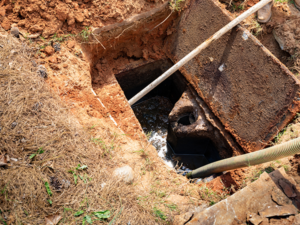Portland / Vancouver Metro - The Dalles - Hermiston OR & Tri Cities WA
 Your septic system is meticulously designed to provide full wastewater capabilities without a sewer connection. Under optimal conditions, your septic system will operate without issue just as a sewer connection would. Most of the time, you won’t even think about your plumbing – that’s the goal. But to ensure it stays this way, your septic system needs regular maintenance. So, let’s talk about how to maintain your septic system.
Your septic system is meticulously designed to provide full wastewater capabilities without a sewer connection. Under optimal conditions, your septic system will operate without issue just as a sewer connection would. Most of the time, you won’t even think about your plumbing – that’s the goal. But to ensure it stays this way, your septic system needs regular maintenance. So, let’s talk about how to maintain your septic system.
How Often Does Your Septic System Need Maintenance?
Should you do septic system maintenance every six months, every year, or every two years? Unfortunately, there’s no clear and concise answer.
The right time for septic system maintenance is when your system needs it, which can be any time. Think of your system as having three main components. Monitor these regularly. If you notice anything unusual, it warrants further investigation.
Here are the three main components:
- Septic tank: the tank itself is the largest and costliest individual component. Make sure you get it pumped on a regular schedule – or whenever it’s needed.
- Drain field: Your drain field is where your septic tank is buried underground. The drain field is worth careful monitoring because it often reveals early warning signs that something is wrong. Pay special attention to flooding, foul smells, and unusually lush grass.
- Pumps and pipes: Your septic system includes pumps and pipes that transport your waste material from your home into your septic tank. If you start noticing small issues or hiccups with your plumbing performance, one of these parts may need attention.
Routine Septic Pumping Is Key
When you have a septic tank system, you develop a feel for it and how often routine pumping services are needed. Indeed, getting your septic tank pumped regularly is one of the most important parts of septic tank maintenance.
So, how often should you get your septic tank pumped? We recommend every two to five years. Yes, that’s a wide range. To determine the right timeline for your business, here are some factors to consider:
- Size of tank
- Number of people using it
- Type of septic tank or system
- Age of system/amount of wear and tear
For more information, check out our full-length guide >> How often to pump your septic tank.
Ready to talk to a septic system expert?
Click below and we'll call you back quickly!
What Not to Dispose of
With any plumbing system, it’s important to watch what you put down the drain. Certain items and substances are more likely to lead to problems. This is especially true with septic systems.
Avoid disposing of any of these in your septic system:
- Grease and oil: As with any plumbing system, cooking oils, fats, and grease can solidify and cause clogs.
- Non-biodegradable wipes and other items: Things like wet wipes, sanitary products, dental floss, and diapers. They do not break down and cause blockages.
- Chemicals and cleaners: Harsh chemicals, including bleach, solvents, pesticides, and household cleaners, can kill the beneficial bacteria in the septic tank that are essential for breaking down waste.
- Medications: Similarly, certain medications can disrupt the bacterial balance.
- Coffee grounds and eggshells: They don’t break down and contribute to sludge buildup in the septic tank.
- Food scraps: Even if you have a garbage disposal, use it only when needed or risk overloading the system. Garbage disposals contribute a lot of waste to septic systems.
- Paint and paint thinners: Toxic substances like these can harm the bacteria in the septic tank and contaminate groundwater.
- Cigarette butts: These are not biodegradable and can cause clogs in the system.
- Cat litter: Even if labeled as flushable, your septic system is not designed to handle it.
How to Maintain Your Drain Field
Your drain field is the area where your septic tank is buried underground. Here’s what you can do to protect it:
- Monitor it: Pay special attention to it and if anything changes, make a note. Ideally, your drain field should not change at all.
- Don’t allow heavy machinery on it: Heavy equipment like tractors can compact the ground and anything beneath it. This can cause damage to your septic tank or constituent parts.
- Remove plants that grow on it: Grass is fine, but don’t let larger plants take root in your drain field. Tree roots are notorious for causing septic tank damage.
How Water Efficiency Affects Your Septic System
If you’re concerned about how often your septic system requires maintenance, consider your water usage. This may seem obvious, but you can significantly reduce the amount of maintenance your septic system needs by reducing the amount of water you use. Less water running through the system means less wear and tear.
Professional Septic Tank Maintenance Service for Your Property
There’s a lot that goes into septic system maintenance, and if you don’t have time for it, don’t worry. That’s why we’re here. Speedy Septic offers professional septic tank maintenance services in Portland OR, Vancouver WA, The Dalles OR, Hermiston OR, and Tri-Cities WA.
To make sure your septic tank lasts as long as possible and continues providing excellent performance, make sure you stay up to date with maintenance. Call us anytime with your maintenance questions or to schedule an appointment.
Back to Septic System Maintenance
How to Maintain Your Septic System in Portland OR and Vancouver WA
Also Serving Customers In These Regions
